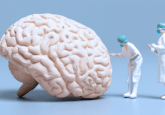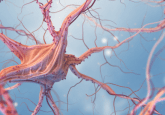Peek behind the paper: Mesenchymal stem cell-neural progenitors attenuate pro-inflammatory microglial activation via paracrine mechanisms

In this ‘Peek behind the paper’, we speak to Violaine Harris from the Tisch Multiple Sclerosis Research Center of New York (USA) about her recent research article published in Regenerative Medicine. Dr Harris gives us a summary of her research and shares her insight into the challenges of understanding the mechanism of action of mesenchymal stem cell-neural progenitors and how the results of this study could benefit research into other neurodegenerative diseases, such as amyotrophic lateral sclerosis (ALS) and Alzheimer’s disease.
 Violaine Harris is a senior research scientist at the Tisch Multiple Sclerosis Research Center (NY, USA), an independent research institute dedicated to finding the cause of and a cure for multiple sclerosis. Her research has focused on developing cell therapy strategies to promote repair and regeneration in multiple sclerosis (MS). Her work has led to the first clinical trial to test bone marrow-derived neural progenitors in patients with MS.
Violaine Harris is a senior research scientist at the Tisch Multiple Sclerosis Research Center (NY, USA), an independent research institute dedicated to finding the cause of and a cure for multiple sclerosis. Her research has focused on developing cell therapy strategies to promote repair and regeneration in multiple sclerosis (MS). Her work has led to the first clinical trial to test bone marrow-derived neural progenitors in patients with MS.
Dr. Harris has had a longstanding interest in stem cell biology and in understanding the mechanisms of cell signalling and differentiation. She received her PhD in Pharmacology from Georgetown University (Washington DC, USA) and her BA in Biochemistry/Molecular, Cellular, and Developmental Biology from the University of Colorado in Boulder (CO, USA). Her training also included a postdoctoral fellowship at Mount Sinai Medical Center (NY, USA), where she studied the mechanisms involved in the maintenance of cancer stem cells.
Please provide a short summary of your paper
Mesenchymal stem cell-neural progenitors (MSC-NPs) are a neuralized subpopulation of MSCs that are currently being tested in clinical trials as an intrathecal injection in patients with multiple sclerosis (MS). It was known from preclinical studies that MSC-NPs can modulate immune responses and exert beneficial effects on glial cells in the brain. However, the current study is the first to identify microglia as a likely therapeutic target of MSC-NPs. The paper shows that MSC-NPs can directly interact with microglia in culture, resulting in a change in microglial phenotype from an activated pro-inflammatory state to a pro-regenerative state. We found that MSC-NPs impact microglial polarization through secreted factors (growth factors, cytokines, extracellular matrix components, etc.) present in the conditioned media of MSC-NPs, suggesting that paracrine, or bystander, mechanisms underlie the therapeutic action of these cells. The study also suggests that TGF-β might be a particularly important factor in mediating the MSC-NP effect on microglia.
What sparked your interest in MSC-NP cell therapy?
In MS, we have drugs that target the immune response but we don’t have anything that targets the neurodegenerative process in progressive disease. Early on we saw a need for a regenerative therapy in MS. As a stem cell biologist, I was excited about MSCs and the translational aspect of using autologous bone marrow as a cell source, but we were worried about transplanting these multipotent cells directly into the brain. We investigated MSC-NPs as an alternative because they have neural characteristics, have increased expression of growth factors and were efficacious in preclinical models of MS. It’s been very exciting to translate autologous MSC-NP therapy into clinical trials and to see the impact that this has had on patients with progressive MS.
In the paper, you addressed some of the challenges with the mechanism of action for MSC-NP cell therapy, how would you suggest we overcome these challenges?
Understanding the mechanism of action of MSC-NPs is essential to optimize this therapeutic approach. However, the mechanisms are likely to be complex, involving a combination of different secreted factors that act together and independently, depending on the target cell. For example, in the current paper, we found that TGF-β signaling is important but clearly not the whole story. One way to overcome this challenge is to better define what factors are secreted by MSC-NPs and to correlate their secretion with both micoglia-based assays in vitro, as well as with clinical outcomes in MSC-NP-treated patients.
What were the main conclusions of your study and what could the results suggest about the efficacy of MSC-NP cell therapy?
The main conclusion from the study, that MSC-NPs directly attenuate the pro-inflammatory phenotype in microglia, has immediate implications in understanding the clinical efficacy of MSC-NPs. Chronically activated microglia play an important role in MS pathogenesis and are thought to be one of the key drivers of disease progression. The understanding that MSC-NPs target activated microglia suggests that MS patients with highly active microglia may have a better response to MSC-NP cell therapy. I am particularly excited about recent research showing that MSC-NP treatment causes a reduction in levels of the biomarker CCL2. CCL2 was used as a readout of active microglia in the current paper and is potentially a biomarker of active microglia in patients. In the future, we may be able to use CCL2 as a personalized biomarker to predict which patients will have a therapeutic response to MSC-NP cell therapy.
What implications does this research have for the field of regenerative medicine?
Like in MS, microglia play an important role in many different neurodegenerative diseases, including amyotrophic lateral sclerosis (ALS) and Alzheimer’s disease. Thus, the current research opens the door to investigate the effects of MSC-NPs in other diseases where the unmet need for novel therapeutic approaches is particularly urgent.
Looking ahead, how do you see the field developing and what are the next steps in this area of research?
There is extensive clinical evidence demonstrating the safety and tolerability of MSC- and MSC-NP-based therapies in MS but evidence of efficacy has been limited. This will change as larger scale clinical trials come to completion, including the Phase II placebo-controlled trial being conducted at the Tisch MS Research Center of New York. What we learn from these clinical studies will help refine and optimize regenerative strategies in MS, specifically by determining which patients are most likely to benefit.

